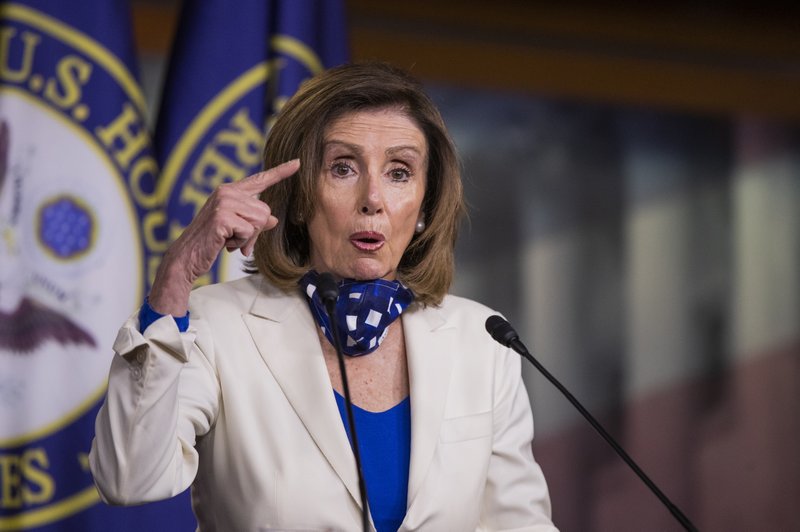Although timing for the House’s return isn’t set, the outlines are emerging for a Democratic-driven bill to aid states and local governments, the Postal Service, and boost contact tracing to track the coronavirus.
Democratic leaders promise that the House will deliver legislation to help state and local governments through the COVID-19 crisis as early as next week, though the measure is still being drafted by committee chairs and party leaders like Speaker Nancy Pelosi, D-Calif.
No. 2 House Democrat Steny Hoyer said Wednesday that party leadership is hoping for bipartisan backing for the upcoming bill, the fifth effort to respond to the devastation COVID-19 has delivered to the economy and U.S. life. Ultimately, it’ll take arduous bipartisan negotiations to produce a bill but the right dynamic hasn’t caught fire yet.
Hoyer said he backs $500 billion in aid to state and local governments with a supplemental aid package for smaller cites left out of previous aid bills. He said the measure would bail out the Postal Service, contain funding for absentee voting this fall, and other priorities like advanced tracing to monitor the virus as states try to open up without sparking a second wave.
Hoyer said the House won’t return to Washington until there is a vote on the next coronavirus bill, saying “it could be as early as next week.”
For now, the House is staying away because of the pandemic, although the GOP-controlled Senate is open. Republicans there face internal divisions over spending and how ambitious to be in the upcoming round to respond to Depression-era jobless levels.
Some Republicans such as Sen. Mitt Romney of Utah and a group of GOP governors want to be more generous to states confronting furloughs and cuts to services as revenues plummet and unemployment insurance and other costs spike.
But Senate Majority Leader Mitch McConnell said Tuesday it’s time to push “pause” on more aid legislation — even as he repeated a “red line” demand that any new aid package include liability protections for hospitals, health care providers and businesses operating and reopening.
McConnell and other Republicans, however, ducked the chance to endorse President Donald Trump’s demand for a cut to Social Security payroll taxes as a salve for the economy. Many lawmakers think the payroll tax cut is a bad idea because it only boosts paychecks but doesn’t help people thrown out of a job.
“I’ve never thought that really would be very effective,” Sen. Susan Collins, R-Maine. She said she’s working with a bipartisan, bicameral group on a state and local aid package.
Trump is encouraging states to reopen and Republicans hope the gradual comeback will kick-start the economy, reducing the pressure for more pricey aid.
Trump took to Twitter on Tuesday with a repackaged set of demands.
“Well run States should not be bailing out poorly run States, using CoronaVirus as the excuse! The elimination of Sanctuary Cities, Payroll Taxes, and perhaps Capital Gains Taxes, must be put on the table,” Trump tweeted.
Romney on Tuesday urged his colleagues to pass additional state aid, with a chart titled “Blue states aren’t the only ones who are screwed,” based on Moody’s Analytics data showing Louisiana, Missouri, Florida, Kansas, and Kentucky competing with New York and New Jersey and the states facing the worst revenue shortfalls.
Details on the package are a ways away, but it’s likely to be anchored by money for state and local governments, including smaller cities. Business interests are pushing hard for additional operating subsidies and relief from COVID-19-related lawsuits.
Senate Republicans are frustrated by a negotiating dynamic on previous bills that empowered Democrats and sent costs spiraling. But they’re reluctant to unleash federal funds beyond the nearly $3 trillion Congress has already approved for virus relief.
“I just don’t think we need to act as quite urgently,” Sen. John Cornyn, R-Texas, told reporters at the Capitol. But Cornyn, who is up for reelection this year, and other rank-and-file Republicans promise there will be further coronavirus legislation.
Ultimately, the legislation is likely to be shaped most by a familiar quartet of congressional leaders including Pelosi and McConnell and top Trump administration officials like Treasury Secretary Steven Mnuchin. But getting talks to critical mass can be a tricky, arduous process given the web of rivalries and internal party considerations involved. Trump’s political fortunes and a spate of bad GOP polling adds new uncertainty.
For her part, Pelosi recognizes that any bill drafted by Democrats will need more thorough culling than early Democratic efforts, which came under GOP attack for easy-to-criticize items like aid to Washington, D.C.’s Kennedy Center and material taken from the so-called Green New Deal.
“I think all of us are going to get our papers graded in November based on how we responded. This is going to be the dominant issue in every election in the country,” Cornyn said.
A freshman Republican senator, Missouri’s Josh Hawley, said: “If we enter a long-term recession or depression, the concerns we have about deficit spending now are going to look like a walk in the park.”
One idea gaining traction among Republicans is to allow greater flexibility on $150 billion in aid that’s already been delivered to states and larger cities. That money is supposed to be used to pay for COVID-19 response, but governors in some states won’t be able to use it all for that purpose and want to use it to make up for revenues lost as the country slides into recession.
(AP)











